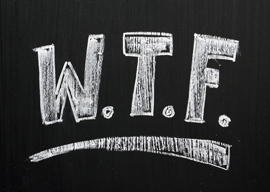
August 04, 2017

Source: Bigstock
What I take to be a very well-oiled revolving door has ejected Mr. Scaramucci from the White House before he had properly got in. I’m not, for the moment anyway, concerned with the rapidly changing cast list of the Trump administration, even though one feels that only Groucho, Harpo, and Chico could do justice to the comings and goings. More interesting and even more depressing is the coarsening of language, as evidenced in Mr. Scaramucci’s on-the-record telephone conversation with a New Yorker journalist. There have always been people, of course, who suppose that foulmouthed abuse makes them tough guys, and I have known newspaper editors who spoke in the office as they mightn’t have dared to speak to their mother or indeed mother-in-law. Sometimes this may alarm timid souls, but not always. People who speak as Mr. Scaramucci spoke sound stupid. “Would you buy a used car from this guy?”
I was brought up to believe that foul language was ill-mannered and indeed a sign of ill breeding. My parents didn’t swear, though my father may have done so when he was a prisoner of war in a Japanese camp. Even so, I never heard him apply any word stronger than “bastards” when speaking of the camp guards. I don’t recall any of my schoolmasters swearing, though doubtless they had provocation enough. Most of my parents’ friends were farmers in the northeast of Scotland. They didn’t swear either, at least not in the presence of women and children. They minded their language because there was a code of manners that they respected.
Even comedians didn’t swear in my youth. Neither the BBC nor theater managements would have allowed them to do so. Swearing was forbidden in movies in the days when the big studios ran Hollywood. This wasn’t because the moguls were nice men—some of them were unquestionably horrors; it was because cinemas wouldn’t have shown films full of foul language, and, if they had done so, audiences would have been offended. There was the odd exception—Clark Gable’s last line in Gone With the Wind, for example. But mostly the convention held good, and movie scripts were the better and wittier for it. Likewise publishers, even of hard-boiled novels, required authors to find alternatives for common swearwords. A different age.
Now anything goes, almost everywhere. What is sometimes called macho language can be heard almost everywhere. Does this make for a better society? Or is it a sign of decadence? If the Nixon Watergate tapes were to be published now, would the expletives be deleted? I guess not.
Sir Peregrine Worsthorne, the former editor of The Sunday Telegraph, is remembered as the first man to say “f—-“ on British television. I can’t remember the context, but I expect he was just showing off and being consciously naughty. It wasn’t his usual way of speaking. I wrote for him sometimes and he once gave me a very agreeable dinner at the Garrick Club. I don’t remember him swearing in conversation.
Of course, there are times when swearing is a relief, an expression of justified exasperation. I swear at my computer quite often when it declines to accede to my requests. There’s no one else in the room and I don’t think my computer cares. (Though one can’t tell about such things these days; how do the robots that operate in care homes react to bad language?)